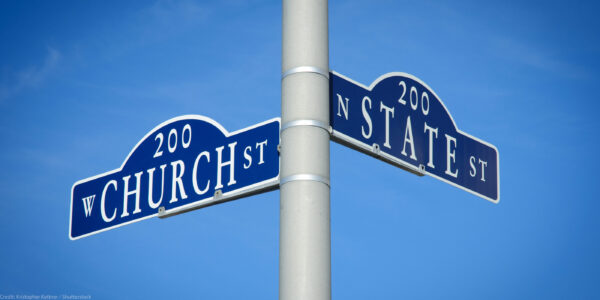ACLU Warns Against Framework Bill For Taxpayer-Funded Religious Discrimination
FOR IMMEDIATE RELEASE
Contact: media@dcaclu.org
WASHINGTON - The American Civil Liberties Union today expressed concern at the Senate markup of a non-controversial segment of the President's faith-based bill, saying that the benign legislation could easily be amended after markup to legitimize in statute taxpayer-funded religious discrimination.
""Senator Santorum said that he plans to amend the bill to further legitimize the President's misguided initiative and promote taxpayer-funded religious discrimination,"" said Christopher Anders, an ACLU Legislative Counsel. ""If amended, the legislation would not be a compassionate approach - it will actually work to institutionalize bias in employment based on religion.""
The Senate Finance Committee, chaired by Sen. Charles Grassley (R-IA), marked up the bill (S. 256) - called the Charity Aid, Recovery and Empowerment Act - this morning. The legislation contains only the tax-related provisions of President Bush's faith-based plan, to which the ACLU does not object, with language that would allow religious groups to discriminate in hiring and the provision of services stripped out.
The non-controversial bill, the ACLU said, could then be easily used on the open Senate floor as a vehicle for the discrimination measures, which would entrench the President's faith-based initiative in statute.
The ACLU has long opposed government-funded religion as a skewering of the rules protecting beneficiaries and employees of taxpayer-funded social services from discrimination in hiring and the provision of services.
The President urged Congress to pass his faith-based initiative at last month's State of the Union address and included a call to funnel $600 million of taxpayer funding to a new voucher program, which would allow religious organizations to provide drug and alcohol treatment without complying with anti-discrimination laws and quality of care standards.
The faith-based controversy was also recently fueled by a front-page New York Times story reporting on an obscure proposed rule change for the Department of Housing and Urban Development. The new policy would allow HUD grants to pay for the bricks-and-mortar construction of religious buildings - a radical policy shift that flies in the face of decades of legal thinking about the First Amendment.
Last fall, the President - after Congress refused to pass his faith-based initiative - signed an executive order unilaterally establishing the program through Presidential fiat.
""This legislation and the President's plan even contradict the wishes of charitable organizations and social service providers,"" Anders said. ""The overwhelming consensus among these communities is that a lack of resources, not the inability to discriminate, is hindering effective public service.""

